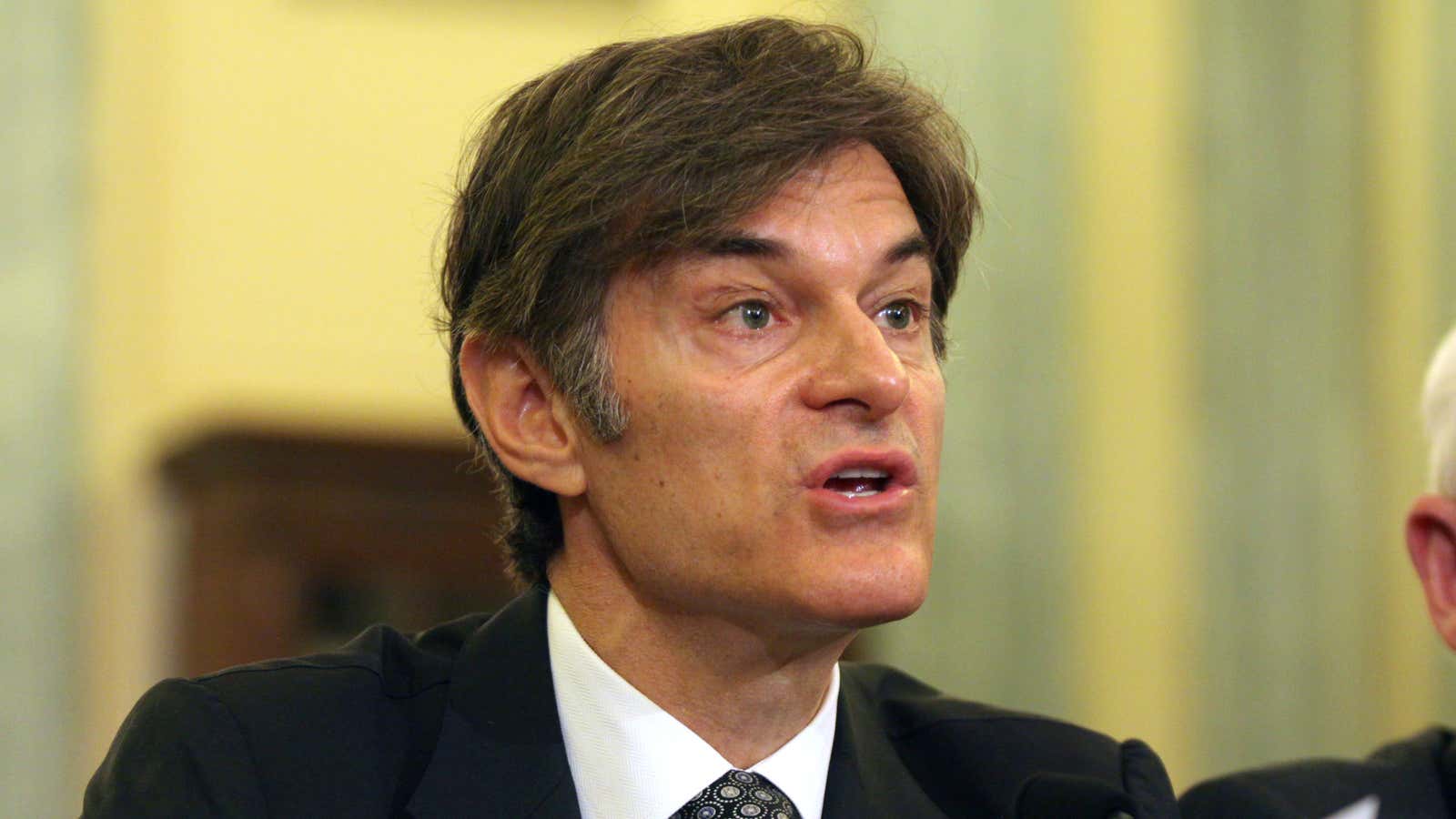If I could invite four people for dinner, alive or dead, they would be Mark Twain, William Shackleton, Christopher Hitchens, and Homer Simpson (Bart’s dad). If Mehmet Oz turned up with a bag of garcinia cambogia, I would excuse myself.
Few things drive me to the abyss more reliably than the banality of status updates on Facebook, and the monotony of health freaks. I would rather face the aftermath of vindaloo followed by industrial strength Picolax than watch an episode of The Dr. Oz Show.
Did you catch that? Show. Like dog and pony show. Punch and Judy show. The Dr. Oz Show is a show. Not to put too fine a point on it, but physicians asking Columbia University to fire Dr. Oz are giving his show more credit than it deserves.
The obvious retort is that Oz is using his position as faculty at a prestigious university to promote dodgy metaphysical claims. Ah, the narcissism of academics! Priceless! As the saying goes, for everything else there is MasterCard…
Does anyone seriously believe that people buy what Oz endorses because he is a professor at Columbia? Then try this experiment: Get a professor of medicine from Harvard to get people to buy a nutritional pill because he is a professor from Harvard.
Oz’s flock listens to Oz because he is Mehmet Oz. He is a brand. They couldn’t care less that he works at Columbia. He got his break not because of the number of studies he has completed, or the impact of his publications, but because he was endorsed by Oprah Winfrey. Got that? If scientists are so envious of showbiz, then they should not be in the business of science.
One might counter that Oz is using his position to misinform people. Specifically, he is misinforming people about alternative and holistic medicine, and a lot of lucrative nutritional supplements. But people don’t listen to Dr. Oz to be “informed.” People aren’t interested in numbers, uncertainty, the idea that more research is needed, or that science is a provisional assumption. People want certitude and solutions. This is why chicanery is fertile. God may be dead, but prophets are still alive and kicking.
Economists have figured this out. They have stopped saying, “On the one hand, QE could save the economy; on the other hand, QE could ruin the future.” People are tired of uncertainty. So now one-handed economists swagger with unprecedented certainty. They have, however, bifurcated into two camps—the Democrat economists and the Republican economists. The two hands remain.
Oz is a product of the masses. He exists because of our love for the circus, and our frustration with uncertainty. Uncertainty is the DNA of science. He exists because science can’t cure our existential angst. If Oz didn’t exist, he would have been invented. If he were not at Columbia, he would have been at Stanford.
I would wager that Oz does not perform cardiac surgery for holistic reasons. Nor will he prescribe Bikram yoga classes to a patient with an acute rupture of the papillary muscles. I suspect he maintains the line between prescribing science and practicing alternative medicine.
Medicine has limitations. If metaphysics fills the void, so be it. Should we concern ourselves with which futility fills the void? They’re all useless. Alternative medicine is certainly less dangerous than the Black-Scholes pricing model that contributed to the financial collapse and caused untold misery. Nobody got a Nobel Prize for homeopathy.
Some lament, “If only Oz used his stardom to endorse evidence-based medicine (EBM), imagine the gains to society.” They miss the point. Oz wouldn’t have been a celebrity if he talked about EBM. If Oz incessantly preached vaccinations, his followers would have tuned him out. If academics want to give Oz a run for his money, here is my advice—scare people witless about the risk of cancer from environmental toxins. I guarantee superstardom.
Another school of thought is that Oz’s followers are victims of propaganda—”If only they were better informed by wise people.” What hubris! This belief not only robs people of moral agency, but uplifts the scholar. “The world would be woefully ill-informed, but for the scholar!”
Many of my family members consult palm readers. It would be utter self-serving narcissism if I thought their belief in astrology resulted from my failure to explain science to them. Actually, I tried objecting, but I was told to shut up.
Oz has done EBM a favor. By making alternative medicine sexy, he has unwittingly made EBM, its antithesis, sexy. Rarely can wisdom exist on its own without a contrasting phenomenon. EBM needs the unprovable to exist—this is the principle of duality. I realize I am veering into the metaphysical, but is there no satisfaction in quenching BS?
There is a troubling implication in the call for the firing of Oz: it is the idea that EBM needs public endorsement. This is dangerous and could be the undoing of EBM. Science is uncertain, murky, and contradictory. The truth is boring. Throwing medical science to the court of public opinion, to the sensationalism of the media catwalk, could make it suffer the same fate as economics. The new age economists who are always certain are celebrities, but seldom right when it matters.
Science can handle Oz. Scientists can’t seem to handle that the public may prefer Oz to science. Be that as it may. But then the fault, dear Brutus, lies with us—not Oz.
This post originally appeared at The Health Care Blog.
